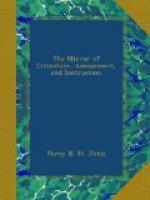Englishman’s Magazine, No 1.
* * * * *
QUEEN ELIZABETH.
From a paper on the Fine Arts of old in England, in Blackwood’s Magazine.
The sex and character of Elizabeth herself was no weak ingredient in the poetic spirit of the time. Loyalty and gallantry blended in the adoration paid her; and the supremacy which she claimed and exercised over the church, invested her regality with a sacred unction that pertained not to feudal sovereigns. It is scarce too much to say, that the virgin-queen appropriated the Catholic honours of the Virgin Mary. She was as great as Diana of the Ephesians. The moon shone but to furnish a type of her bright and stainless maidenhood. To magnify her greatness, the humility of courtly adulation merged in the ecstasies of Platonic love. She was charming by indefeasible right;—a jure divino beauty. Her fascinations multiplied with her wrinkles, and her admirers might have anticipated the conceit of Cowley,
“The antipevistoisis of age
More inflamed their amorous rage.”
It is easy for a Whig, or a Puritan, or any other unimaginative blockhead, to cry out against all this as nauseous flattery, and assert that after all she was rather an unpoetical personage than otherwise—a coarse-minded old maid, half prude, half coquette, whose better part was mannish, and all that belonged to her sex a ludicrous exaggeration of its weaknesses. But meanwhile, they overlook the fact, that not the woman Elizabeth, but the Virgin-queen, the royal heroine, is the theme of admiration. Not the petty virtues, the pretty sensibilities, the cheap charity, the prim decorum, which modern flatterers dwell upon, degrading royalty, while they palaver its possessor, but Britannia’s sacred majesty, enshrined in chaste and lofty womanhood. Our ancestors paid their compliments to sex or rank—ours are addressed to the person. There is no flattery where there is no falsehood—no falsehood where there is no deception. Loyalty of old was a passion, and passion has a truth of its own—and as language does not always furnish expressions exactly adapted, or native to the feeling, what can the loyal poet do, but take the most precious portion of the currency, and impress it with the mint-mark of his own devoted fancy? Perhaps there never was a more panegyrical rhymer than Spenser, and yet, so fine and ethereal is his incense, that the breath of morning is not more cool and salutary:—
“It falls me here to write of Chastity
That fayrest virtue, far above the rest.
For which what needs me fetch from Faery,
Forreine ensamples it to have exprest,
Sith it is shrined in my soveraine’s
brest,
And form’d so lively on each perfect
part,
That to all ladies, who have it protest,
Needs but behold the pourtraict of her
part,
If pourtray’d it might be by any




